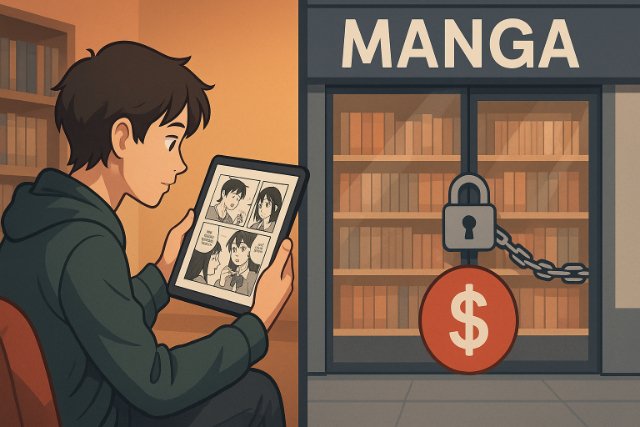Introduction
Olympus Scanlation is one of the many fan-organized groups that emerged from the passionate global manga and manhwa community. Dedicated to translating works from Japanese, Korean, and Chinese into widely accessible languages, this group has earned recognition for consistent quality and punctual releases. While its work provides international fans with faster access to stories, Olympus also operates in a copyright grey zone, raising ethical and legal questions. This article takes a deep dive into how Olympus Scanlation functions, the reasons readers turn to them, the risks involved, and the broader implications for creators and the publishing industry.
What is Olympus Scanlation and How Did It Start?
Olympus Scanlation is a fan-driven collective that translates and publishes manga, manhwa, and manhua for free online consumption. The group operates anonymously, relying on volunteers who share a passion for making unlicensed works accessible to global audiences. Although exact dates of origin are unclear, Olympus is often mentioned in forums as an established and reliable group with a focus on quality.
The roots of Olympus trace back to the broader history of scanlation, a practice that began in the late 1990s when fans started scanning raw manga pages, translating dialogue, and distributing them digitally. Like other groups, Olympus follows this tradition, adapting to new digital tools and maintaining a reputation for consistency. Its presence in fan communities helped it gain followers quickly, especially among readers seeking series that publishers overlooked.
In the larger context, Olympus represents one node in a vast network of fan translation teams. Some compete, some cooperate, and others fade away after short lifespans. Olympus, however, has endured long enough to become a recognizable name, particularly in Discord communities, Reddit threads, and manga aggregator sites.
How Does Olympus Scanlation Operate?

Olympus follows the typical scanlation workflow: acquiring raw material, translating it, editing and cleaning the images, typesetting the dialogue, and conducting quality control before release. Each step is vital to ensure readability and accuracy.
The main roles inside Olympus include translators (who understand Japanese, Korean, or Chinese), cleaners (who remove original text and restore artwork), typesetters (who insert translated dialogue with fitting fonts), and proofreaders (who check grammar and consistency). Team leaders coordinate workflow, deadlines, and release schedules.
Quality control is particularly emphasized in Olympus’ reputation. Unlike hastily made machine translations, Olympus releases usually go through multiple proofreads, resulting in fewer awkward phrases and more natural cultural localization. This attention to detail has allowed the group to stand out compared to smaller, less organized teams.
What Are the Steps in Their Workflow?
- Scanning or sourcing raws – either from digital purchases, leaks, or community contributors.
- Translation – converting dialogue into the target language while retaining cultural nuance.
- Cleaning and redrawing – removing Japanese/Korean/Chinese text bubbles and repairing artwork.
- Typesetting – inserting translated text with stylistic alignment to the original.
- Proofreading & QC – ensuring accuracy, fluency, and visual balance.
- Release – distributing via online forums, reader apps, or aggregator sites.
Who Are the Roles Inside Their Team?
- Translators → convert source language into English.
- Cleaners → digitally erase original text and restore art.
- Typesetters → reinsert translations with appropriate fonts.
- Proofreaders → review grammar, flow, and consistency.
- Coordinators → manage timelines, assign tasks, and ensure group cohesion.
How Do They Manage Quality Control and Consistency?
Olympus uses a tiered review process, where chapters are checked by multiple members before release. Standardized style guides, preferred fonts, and glossary lists for recurring terms help maintain consistency across series. This system reduces errors and keeps translations smooth.
Why Do Fans Turn to Olympus Scanlation Instead of Official Sources?

Readers often rely on Olympus because official translations are either unavailable, delayed, or locked behind regional restrictions. For many, Olympus fills a gap by providing access to series that may never be licensed.
Accessibility and speed are key motivators. While publishers like Viz Media or Shueisha may take months to release translations, Olympus often completes chapters within days of their original release. Fans eager to stay current turn to scanlations for immediacy.
Another reason is cultural fidelity. Many fans feel Olympus preserves jokes, honorifics, and references that official localizations may erase. This perception reinforces Olympus’ reputation as “by fans, for fans,” even if it operates outside legal frameworks.
Is Olympus Scanlation Legal or Ethical?
Legally, Olympus operates in a grey but largely illegal zone. Copyright laws in the U.S., Japan, South Korea, and China all prohibit unauthorized reproduction and distribution of works. International treaties like the Berne Convention extend these protections across borders.
Some argue that scanlation is ethically defensible when works are unlicensed or unavailable, as it allows global fans to access content that publishers ignore. However, once a title becomes licensed, continuing to distribute scanlations directly undermines creators’ profits.
The risks extend to both users and creators. Publishers may issue takedown notices or pursue lawsuits, though enforcement often targets aggregator sites rather than individual groups. Still, creators frequently voice frustration that scanlation cuts into potential revenue and damages industry growth.
What Laws or International Treaties Apply to Scanlation?
- Berne Convention (1886) – protects authors’ rights internationally.
- U.S. Copyright Act – prohibits unauthorized reproduction/distribution.
- Japanese Copyright Law – explicitly bans translation without rights.
- Digital Millennium Copyright Act (DMCA) – used to issue takedown notices.
Can Scanlation Ever Be Justified?
Supporters argue scanlations serve a preservation role, especially for series unlikely to receive localization. Critics argue that ethical justification ends once works gain official releases.
What Are the Risks to Users and Creators?
- For users: malware risk, legal exposure, and reliance on unstable sites.
- For creators: financial loss, lack of control over their work, and diminished publisher interest in licensing.
How Reliable and Safe is Olympus Scanlation?
Reliability refers to both translation quality and technical safety. Olympus is considered relatively consistent in quality, but safety depends on where users access its releases.
Scanlation content often circulates through third-party aggregator sites filled with intrusive ads, malware, and phishing schemes. Olympus itself does not control these platforms, which makes security unpredictable.
Readers are advised to exercise caution. Using ad blockers, VPNs, and antivirus protection can mitigate risks. Still, compared to official platforms, scanlation sites always pose higher security vulnerabilities.
What Are the Potential Security or Malware Risks?
- Fake download buttons leading to spyware.
- Pop-up ads redirecting to phishing sites.
- Malicious scripts hidden in viewer platforms.
How Can Users Assess Trustworthiness?
- Check official Discord/Reddit announcements for authentic release links.
- Avoid unknown aggregator URLs.
- Use community-vetted sources only.
What Precautions Can Readers Take?
- Install ad blockers and antivirus software.
- Use a VPN to mask browsing activity.
- Never download files from suspicious hosting links.
How Can a Reader Use or Contribute to Olympus Scanlation?
Readers typically encounter Olympus releases on aggregator platforms or community-distributed links. Olympus itself rarely maintains a permanent public-facing site due to legal pressure.
For contributions, Olympus sometimes recruits volunteers via Discord or forums. Roles such as translator, cleaner, or proofreader are open to applicants who pass basic skill tests. Commitment and consistency are valued more than professional experience.
Guidelines stress confidentiality, teamwork, and respect for deadlines. Olympus like other groups relies on motivated volunteers willing to dedicate hours to unpaid labor, all for the sake of community sharing.
Where Are Their Releases Hosted?
- Community Discords
- Manga aggregator sites (not controlled by Olympus)
- Temporary file-sharing links
What Guidelines Do They Enforce for Contributors?
- Respect internal deadlines.
- Follow the style guide.
- Avoid leaking unreleased chapters.
- Maintain anonymity for team protection.
What Are Alternatives and Better Ways to Support Manga Creators?
While Olympus provides accessibility, supporting official channels ensures creators and publishers are compensated. Legal platforms have expanded significantly in recent years.
Services like Manga Plus (Shueisha), Crunchyroll Manga, Viz Media’s Shonen Jump, and Webtoon offer affordable and legal access. These platforms often feature simultaneous release schedules (“simulpubs”) that rival scanlation in speed.
Publishers have also introduced subscription models, making legal access more affordable. For fans who care about the long-term survival of their favorite series, subscribing is the ethical choice.
What Official Platforms Exist?
| Platform | Focus | Pricing | Strengths |
| Manga Plus (Shueisha) | Shonen manga | Free/ads | Simultaneous releases |
| Viz Media (Shonen Jump) | Manga | $1.99/month | Huge back catalog |
| Crunchyroll Manga | Manga | Included in subscription | Anime + manga bundle |
| Webtoon | Manhwa | Free/coin system | Strong mobile platform |
How to Choose Between Legal vs Fan Translations?
- Speed vs sustainability → Scanlation is faster, but unsustainable.
- Accuracy vs fidelity → Fan groups preserve cultural nuance; official teams prioritize localization.
- Ethics vs access → Official supports creators; fan works serve access gaps.
What Policies Might Publishers Use to Counter Scanlation?
- Simulpub releases – reducing time gaps.
- Legal enforcement – DMCA takedowns, cease-and-desist letters.
- Community outreach – encouraging fans to support legal options.
Conclusion
Olympus Scanlation reflects both the passion and the tension within global manga fandom. It provides access, cultural preservation, and speed, but also operates in a legally and ethically problematic space. For readers, Olympus is a trusted name, yet it cannot replace the sustainability of official channels. Supporting creators through licensed platforms remains the most impactful choice.
Conclusion
OntPress FreshUpdates is more than just another news aggregator it represents a shift toward trustworthy, real-time, personalized content delivery. By blending AI-driven speed with editorial oversight, it addresses the challenges of misinformation, noise, and user fatigue that plague traditional platforms. Its roadmap suggests even deeper integration with emerging formats and devices, positioning it as a future-proof player in digital news. For readers, professionals, and publishers alike, the platform delivers clarity in a noisy information landscape.
Explore more insightful and valuable content on our blog VeoTag.com! Stay updated with helpful tips, expert advice, and in-depth articles that enhance your knowledge.
Read Also:
Social Media Girls Forum Safety Guide
Murray Hone: Life, Career & Where He Is Now
Daylen Ali Carolina: Biography, Family, Privacy
Eian Burton: Quiet Strength Behind a Famous Name
Harlene Rosen: The Untold Story Behind Woody Allen’s First Marriage
Maxine Sneed: The Quiet Life, Legacy, and Influence Behind the Chong Family
Lori Brice: Untold Story of Ron White’s First Wife
FAQ’s
Olympus Scanlation is a fan-based group translating manga, manhwa, and manhua into English and distributing them online without official rights.
Raws are obtained through digital purchases, leaks, or contributor sharing. Translators then render text into English, followed by editing and typesetting.
No. Reading scanlations exists in a grey area, but distribution is explicitly illegal under copyright law.
Safety depends on the hosting site. Many aggregator platforms contain ads and malware risks.
Yes, if you have translation, cleaning, or typesetting skills. Recruitment usually happens via Discord or forums.
Olympus is known for relatively high accuracy, polished typesetting, and consistent quality compared to less
Subscribe to official platforms like Manga Plus, Viz Media, or Webtoon to support creators directly.
Many oppose scanlation, arguing it undermines revenue and delays licensing opportunities. Some issue takedowns to limit distribution.

